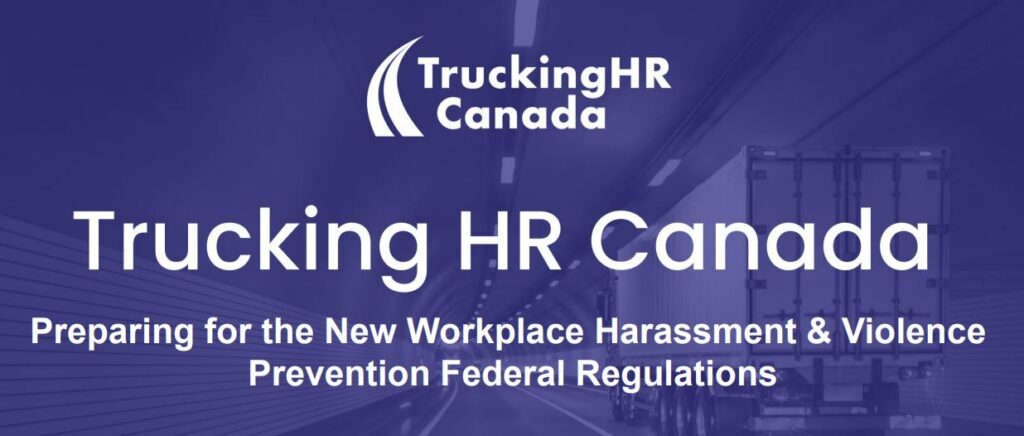Trucking HR to fleets: Prepare for Bill C-65
OTTAWA, Ont. – Trucking HR Canada is calling on employers to prepare for the new Workplace Harassment and Violence Prevention Regulations, which come into force on New Year’s Day.
Bill C-65 replaces a patchwork of policies with a clear set of rules.

On Monday, Trucking HR held a webinar to discuss its implications, and offer advice on what employers are required to do under the legislation.
CEO Angela Splinter said in addition to being a compliance issue, the implementation of the bill should also be seen as an HR best practice.
She said it will certainly have an impact on the image of trucking.
“We all know that we need to project a more positive image of our industry as we are looking to recruit young people, more women and others, ensuring that we are meeting all of our workforce needs,” Splinter said.
And, to improve the image, Trucking HR said it will start offering training as early as January.

What is in Bill C-65
Bill C-65 applies to all federally regulated workplaces, and the trucking and logistics sector represents the largest portion of them.
“It aims to strengthen the provisions in the CLC (Canada Labour Code), putting into place one comprehensive approach, which takes into account the full spectrum of harassment and violence into consideration,” said labor lawyer Miguel Mangalindan of Monkhouse Law.
Workplace harassment and violence can have severe impacts on employees, on clients and on the overall reputation of a company, he said.
Workplace harassment is “any action, conduct or comment, including of a sexual nature, that can reasonably be expected to cause offence, humiliation or other physical or psychological injury or illness to an employee.”
– Labor lawyer Miguel Mangalindan.
A 2019 Trucking HR research concluded that 15% of employees in the industry experienced an incident of workplace harassment or violence over the previous 12 months.
That is just slightly below the Canadian workforce average of 16%.
So, what exactly is workplace harassment?
Mangalindan said it is defined as, “Any action, conduct or comment, including of a sexual nature, that can reasonably be expected to cause offence, humiliation or other physical or psychological injury or illness to an employee, including any prescribed action, conduct or comment.”
He stressed that harassment could be psychological injury or illness. It could also just one single incident.
Mangalindan said the legislation has three main goals.
The first is to prevent harassment and violence, second is to respond to reports of harassment and violence if they occur, and third is to offer support to victims.

Employer obligations
The employers have to meet various obligations under the new regulations.
They include:
- Workplace assessment: Identify risk factors in the workplace, and within six months of identifying those, implement preventative measures to mitigate the risk factors;
- Put emergency procedures in place for immediate danger situations;
- Provide training for all employees, and inform them of their rights and responsibilities;
- Record and report all occurrences of harassment and violence; and
- Appoint a “designated recipient”, who will serve as a point of contact for employees for bringing complaints. This individual cannot hold a managerial position in the company.

Training program
Trucking HR is teaming up with the Canadian Trucking Alliance (CTA), the federal government and provincial trucking organizations to offer training.
“It is built for the industry, and it is built by the industry,” said Marisha Tardif, program analyst at Trucking HR.
“With Trucking HR, we are always trying to deliver resources that are at that very cutting edge of best practice and excellence in HR. So, you can feel comfortable knowing that this is coming from a reliable source,” said Tardif.
Mangalindan added that provincial training programs are not suitable for Bill C-65.
“They are similar in many ways, but there are crucial differences. It would not be prudent for employers to just have one training apply both federally and provincially,” he said.
Trucking HR is planning to launch the online training program in the first week of January. In-person training is expected to begin in the spring of 2021.
Click here for more information about the training programs.
Have your say
This is a moderated forum. Comments will no longer be published unless they are accompanied by a first and last name and a verifiable email address. (Today's Trucking will not publish or share the email address.) Profane language and content deemed to be libelous, racist, or threatening in nature will not be published under any circumstances.
If everyone treated everyone else the way that they wanted to be treated, there would be no need for hundreds of rules and regulations that just confuse everyone!
A snowflake protection law
I would imagine that considering the nature of the trucking business, most companies are very small, many only have one employee. I agree with George Doonan and Paul McKechnie, we don’t need anymore political red tape, what we need is more respect for one another.
Hi
Do we have any possibility of USA temporary visa issuance for Canadian citizen truck drivers?
Please write and suggest this idea in your newspaper.
more bureaucracy to kill industry. sure glad i sold out this is just the start of complete government control